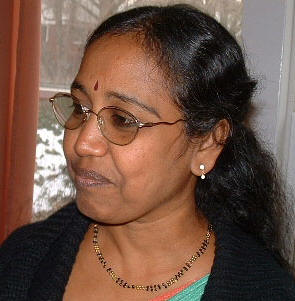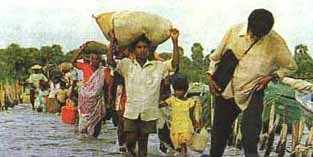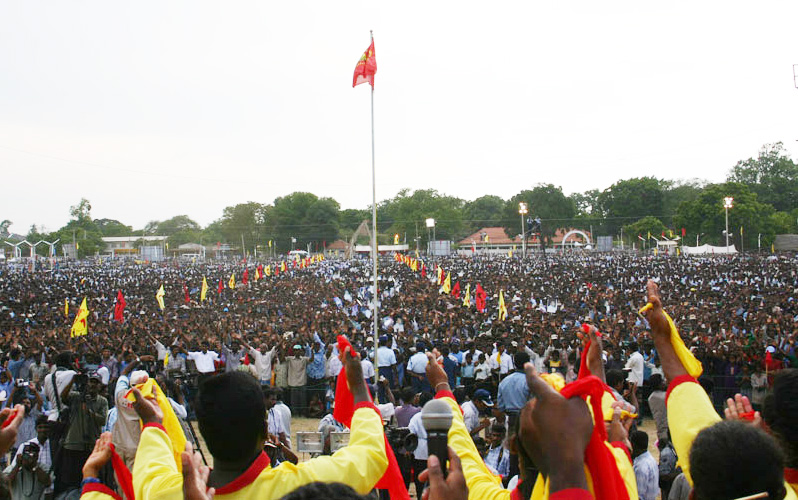|
INTERNATIONAL FRAME
&
THE STRUGGLE for Tamil Eelam
International political advocacy
indispensable to maturing Tamil struggle
Pathmini Sithamparanathan, Tamil National Alliance (TNA),
& first woman Member of Parliament (MP) for Jaffna
[TamilNet, December
19, 2005]
 “Congressional
meetings gave me hope that a conducive atmosphere is emerging in the supreme
legislative body of the US with regards to
the Tamil struggle. It is
critical that we maintain sustained efforts to reinforce relationships with
congresspersons interested in our struggle, and address
human rights issues
raised by UN agencies and watchdogs. With the maturing phase of our struggle,
focussed political action in major world
capitals has become an urgent priority,” said Pathmini Sithamparanathan of
Tamil National Alliance (TNA), and the first woman Member of Parliament (MP) for
Jaffna, when she talked to TamilNet in Washington D.C concluding her two-week
speaking tour in US Saturday. “Congressional
meetings gave me hope that a conducive atmosphere is emerging in the supreme
legislative body of the US with regards to
the Tamil struggle. It is
critical that we maintain sustained efforts to reinforce relationships with
congresspersons interested in our struggle, and address
human rights issues
raised by UN agencies and watchdogs. With the maturing phase of our struggle,
focussed political action in major world
capitals has become an urgent priority,” said Pathmini Sithamparanathan of
Tamil National Alliance (TNA), and the first woman Member of Parliament (MP) for
Jaffna, when she talked to TamilNet in Washington D.C concluding her two-week
speaking tour in US Saturday.
Ms Sithamparanathan, accompanied by her humanities professor husband, addressed
several functions organized by expatriate Tamil community in several US states
during her visit. She also met with several Congresspersons and UN agencies to
apprise them of the humanitarian, economic and human rights situation on the
ground and to respond to their concerns on issues affecting Tamil people, visit
organizers said.
The affable social activist turned politician talked in length with TamilNet on
her vist to US, social work, the path leading her to politics and the Tamil
struggle.
Full text of her interview follows:
TamilNet: Can you tell us the reason for your visit to the US and your
views and impressions as you conclude your visit?
Sithamparanathan: I was invited by the
Florida Tamil
Sangam to address their annual gathering on 11th December. We arrived a
few days earlier, as organizers had arranged for us to meet with Tamil
expatriates in other states. Last few days we met with several
Congresspersons and Senior Analysts at two well known Policy Institutes in
Washington D.C.
Meetings with Congresspersons went well and I felt that many had a good
grasp of the fundamentals of the conflict in Sri Lanka. Congressional staff
shared ideas to further advance the position of Tamil people in the
international scene, and we are discussing with our Tamil activist friends
here on how to organize our political advocacy more efficiently in the light
of these suggestions.
We, however, had hostile reactions from some members of Washington Policy
institutes to the election boycott. Although from Tamil peoples’ perspective
the boycott was a logical choice, coming from a liberal democratic
environment many analysts find the failure to exercise franchise a
regressive step. We are also aware that the election loss for the West's
preferred candidate due to the boycott may have drawn the ire of these
institutes.
We learnt the immediate concerns of UN agencies on the human right’s front.
We will convey the specific issues that need to be addressed in the short
term to the
North East Subcommittee on Human Rights (NESOHR).
TamilNet: Can you expand on the background to the
election boycott by the Tamils of NorthEast?
Sithamparanathan: More than six weeks prior to the
Sri Lanka Presidential elections Tamil people started discussing widely on
the political underpinnings of Sri Lanka presidential elections. Tamil
National Alliance (TNA) members started explaining to the electorate the
differences between parliamentary and presidential elections, and how they
affect the Tamil people. “Presidential
election, conducted in a majoritarian democracy, always elects a Sinhala
president. Sovereignty of Tamil people is exploited to advance Sinhala
interests in this exercise,” we told our people. The discussions during the
six weeks converged into a collective decision by the NorthEast Tamils to
abstain from voting. Liberation Tigers’ statement near the election date
expressing disinterest in the elections helped to cement the decision by the
Tamil people for a total boycott.
TamilNet: Can you explain to our readers your background
for entry into Tamil politics?
Sithamparanathan: I have always been a social
activist interested in women’s rights and welfare. After getting a degree in
humanities from University of Jaffna, I was a teacher from 1984
until
the Jaffna displacement in 1995.

During this period I was involved, with my husband, in
conducting workshops for women, to overcome any psychological impacts of
war. We used theater and drama as the main instruments to help these women
to recover. I returned to Jaffna and until 2004 continued working full-time
with women groups. This work led to the request from TNA officials asking me
to stand for the 2004 elections.
TamilNet: As the first woman MP in Jaffna district, can
you tell us how the new position as an MP working out for you?
Sithamparanathan: I experienced first hand the
difficulties women holding political positions face in Jaffna. The media and
other publicity organs were not used to engaging women candidates and
ignored my campaign during the early stages. I learnt quickly ways to
address the situation. I called a press meeting with editors of local press
and explained to them the need to provide equal access to all candidates.
Since I have been working with a large number of women groups, these women
became my volunteer campaign staff. I had to assert myself to be treated
equally even among my peer candidates who were not used to having a woman
candidate.
Parliament gave me a forum to expose grievances of women in the Northeast.
Foreign embassies started to give more recognition to women candidates and
this further helped women MPs to take advantage of the opportunities to
advance the cause of our people, our electorate, and the
rights of women
in particular.
TamilNet: Can you comment on the recent unrest in Jaffna
and islets?
 Sithamparanathan:
People in Jaffna have reached a breaking point. In addition to the thousands
displaced from their homes and living is shelters, the burgeoning presence
of thousands of armed troops is a lurking danger to our conservative
society, especially young women. Unlike in the West, houses and compounds in
Jaffna are open. During search operations, Sri Lankan Army has a habit of
trespassing into compounds unannounced endangering the freedom of movement
of the people. The
Punguduthivu rape and murder of a 20 year woman allegedly by the Sri
Lanka Navy soldiers is a clear sign of the deteriorating situation. Students
are also becoming more vocal and active, irritated by the continued SLA
presence in Jaffna. Sithamparanathan:
People in Jaffna have reached a breaking point. In addition to the thousands
displaced from their homes and living is shelters, the burgeoning presence
of thousands of armed troops is a lurking danger to our conservative
society, especially young women. Unlike in the West, houses and compounds in
Jaffna are open. During search operations, Sri Lankan Army has a habit of
trespassing into compounds unannounced endangering the freedom of movement
of the people. The
Punguduthivu rape and murder of a 20 year woman allegedly by the Sri
Lanka Navy soldiers is a clear sign of the deteriorating situation. Students
are also becoming more vocal and active, irritated by the continued SLA
presence in Jaffna.
These are ominous signs that situation will deteriorate unless there is
discernible progress in peace talks.
Pongu Thamil allowed our people to express their feelings, and
organizers are planning to have village level uprising as an attempt to
further unify the Tamil people.

TamilNet: Do you have any advice to the
expatriates in the US?
Sithamparanathan: On the contrary, we have benefitted
enormously by this visit seeing the efforts of our friends here in creating
a better environment for our people. We see a commitment and energy that I
have not expected and this has made us feel strong. Also we have witnessed
closely the enormous
potential of technology. We return satisfied and enriched by our
experience here.
|